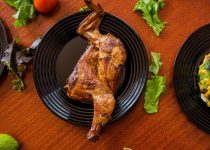Safe & Sizzling: Your Unburnt Guide to Griller Care
Are you tired of burnt food and grill mishaps? Look no further! ‘Safe & Sizzling: Your Unburnt Guide to Griller Care’ is here to save the day.
In this article, we’ll show you essential maintenance tips, how to keep your griller clean, ensure proper ventilation, and take necessary safety measures.
We’ll even troubleshoot common griller issues and teach you how to season and prepare your griller for cooking.
Get ready for a sizzling grilling experience!
Table of Contents
Key Takeaways
- Rustproofing is essential to prevent rust formation on your griller.
- Proper ventilation and airflow ensure even heat distribution during grilling.
- Keeping the grill clean and using a drip pan helps prevent flare-ups.
- Adhering to safety measures, such as having a fire extinguisher nearby and checking for gas leaks, is crucial for a safe grilling experience.
Griller Maintenance Essentials
To keep your griller in top shape, you need to follow a few essential maintenance steps.
One important aspect of griller care is rustproofing. Over time, exposure to moisture and heat can cause your griller to develop rust, which can’t only affect its appearance but also compromise its performance. To prevent this, make sure to clean your griller thoroughly after each use and dry it completely. Additionally, you can apply a rustproofing agent to the metal surfaces of your griller. These products create a protective barrier that helps to prevent rust formation.
Another maintenance step to consider is investing in a griller cover. A cover can provide protection from the elements, such as rain, snow, and UV rays, which can cause damage to your griller. When choosing a cover, opt for one that’s made of durable and waterproof material. Ensure that it fits your griller properly, covering it completely.
Cleaning Your Griller
Keep your griller spotless by regularly cleaning it after each use. Deep cleaning your griller is important to remove grease and ensure its longevity. Here are some steps to help you effectively clean your griller:
- Start by disconnecting the gas or power supply to ensure your safety.
- Use a wire brush to remove any food particles or debris from the grates. Scrub in a circular motion to dislodge stubborn residue.
- For a deep clean, mix equal parts water and vinegar in a spray bottle. Spray this solution onto the grates and let it sit for a few minutes to loosen grease.
- Scrub the grates again with the wire brush, paying extra attention to any stubborn spots. Rinse thoroughly with water and wipe dry.
Ensuring Proper Ventilation
To ensure proper ventilation for your griller, it’s important to understand the benefits of airflow.
Adequate airflow allows for even heat distribution, ensuring that your food cooks evenly.
It also helps prevent flare-ups by allowing excess grease and fat to burn off, reducing the risk of dangerous flames.
Additionally, proper ventilation helps to minimize smoke production, ensuring a more enjoyable grilling experience.
Airflow for Heat Distribution
Ensure proper heat distribution and ventilation by maintaining sufficient airflow in your grill. Adequate airflow is crucial for consistent and even cooking. Here are some tips to help you achieve optimal airflow:
-
Keep the vents open: The vents on your grill allow air to flow in and out, controlling the temperature and heat distribution. Make sure they’re clear and unobstructed.
-
Use a chimney starter: A chimney starter helps create a strong draft, promoting airflow and allowing the charcoal to heat up quickly and evenly.
-
Position your griller accessories strategically: Proper placement of griller accessories, such as drip pans and heat diffusers, can help regulate airflow and distribute heat more evenly.
-
Monitor and adjust as needed: Regularly check the temperature inside your grill and make adjustments to the vents and accessories as necessary to maintain the desired level of heat control.
Preventing Flare-Ups and Smoke
Maintain proper ventilation to prevent flare-ups and smoke in your grill. Flare-ups occur when fat or oil drips onto the hot coals or burner, causing sudden bursts of flames. To prevent flare-ups, follow these techniques:
| Flare-up Prevention Techniques | Smoke Reduction Methods |
|---|---|
| Keep the grill clean | Use a drip pan |
| Trim excess fat from meat | Use indirect grilling |
| Keep a spray bottle of water nearby | Soak wood chips before using |
In addition to flare-ups, smoke can also be an issue when grilling. To reduce smoke, try these methods:
| Flare-up Prevention Techniques | Smoke Reduction Methods |
|---|---|
| Use hardwood charcoal or natural gas | Avoid using lighter fluid |
| Preheat the grill before cooking | Adjust the vents for proper airflow |
| Use a smoker box for wood chips | Cook with the lid on for better smoke control |
Safety Measures and Precautions
For optimal safety when using your grill, remember to adhere to the following safety measures and precautions:
-
Keep a fire extinguisher nearby: Accidents can happen, so it’s important to have a fire extinguisher within reach at all times. Make sure it’s suitable for grease fires, as these are common when grilling.
-
Clean your grill regularly: Built-up grease and food debris can increase the risk of flare-ups. Clean your grill thoroughly after each use to prevent these flare-ups and keep your grill in good working condition.
-
Check for gas leaks: Before igniting your grill, always check for gas leaks. Apply a solution of soapy water to the gas connections and look for bubbles. If you spot any bubbles, there might be a leak, and you should have it repaired before using the grill.
-
Never leave your grill unattended: It may be tempting to step away for a moment, but leaving your grill unattended can lead to accidents. Stay vigilant and keep an eye on your grill at all times.
Troubleshooting Common Griller Issues
Having trouble with your griller?
Two common issues that you might encounter are uneven heat distribution and ignition problems.
These problems can make it difficult to cook your food evenly and start the griller.
Let’s take a closer look at how you can troubleshoot these common griller issues.
Uneven Heat Distribution
To ensure even heat distribution on your grill, regularly check and clean the burners. Proper airflow management and temperature control are crucial for achieving consistent heat across the cooking surface.
Here are some tips to troubleshoot uneven heat distribution:
-
Clean the burners: Remove any debris or food particles that may be blocking the burner ports. This will improve the flow of gas and ensure an even flame.
-
Adjust the burner tubes: Make sure the burner tubes are properly aligned and positioned. Misaligned or clogged tubes can disrupt the airflow and result in hot and cold spots on the grill.
-
Check the gas regulator: A faulty gas regulator can cause uneven heat distribution. Inspect the regulator for any signs of damage or leaks and replace if necessary.
-
Use heat diffusers: Heat diffusers, like lava rocks or ceramic briquettes, can help distribute heat more evenly by absorbing and radiating heat. Place them on the grill grates to create a buffer between the burners and the food.
Ignition Problems
To troubleshoot common griller issues, start by addressing ignition problems. If your griller isn’t igniting properly, there are a few troubleshooting tips you can try before calling for professional help.
First, check if the gas supply valve is open and the propane tank isn’t empty. Make sure the burner control knobs are turned off before turning on the gas supply.
If the ignition system uses a battery, replace it if it’s weak or dead. Clean the ignition electrodes and ensure they’re properly aligned with the burner ports.
If these common solutions don’t work, it might be time to consult the manufacturer’s manual or contact a professional for further assistance.
Seasoning and Preparing Your Griller for Cooking
To ensure optimal performance and longevity of your griller, it’s crucial to season and prepare it before cooking. By taking the time to properly prepare your griller surface and preheat it, you can enhance the flavor of your food and prevent sticking or burning.
Here are some essential steps to follow when seasoning and preparing your griller:
-
Clean the griller surface: Before you start cooking, make sure to clean the griller surface thoroughly. Use a grill brush to remove any residue or debris from previous use. This will help prevent any unwanted flavors from transferring to your food.
-
Oil the griller surface: Next, apply a thin layer of cooking oil to the griller surface. This will help create a non-stick surface and prevent your food from sticking. Use a paper towel or brush to evenly coat the griller.
-
Preheat the griller: Preheating your griller is essential for even cooking and to ensure that your food cooks properly. Turn on the griller and let it heat up for about 10-15 minutes. This will also help to kill any bacteria or germs that may be present.
-
Benefits of preheating: Preheating your griller has several benefits. It helps to sear the food quickly, creating a delicious crust and locking in the juices. It also helps to prevent your food from sticking to the griller surface.
By following these simple steps, you can ensure that your griller is properly seasoned and prepared for cooking. This won’t only enhance the flavor of your food but also extend the life of your griller.
Happy grilling!
Frequently Asked Questions
How Often Should I Clean My Griller?
You should clean your griller regularly to ensure proper maintenance. It’s important to establish a griller cleaning schedule and stick to it. Regular cleaning will help prevent grease buildup and maintain optimal grilling performance.
Can I Use Regular Household Cleaning Products to Clean My Griller?
Yes, you can use regular household cleaning products to clean your griller. However, it’s important to follow cleaning tips and use specific types of griller cleaning products for optimal safety and effectiveness.
How Do I Check if the Ventilation System in My Griller Is Working Properly?
To check if your griller’s ventilation system is working properly, start by inspecting the vents for any blockages. Then, turn on the griller and feel for the airflow. If it’s weak or non-existent, there may be an issue that requires griller maintenance or troubleshooting.
What Should I Do if I Smell Gas While Using My Griller?
If you smell gas while using your griller, take immediate action. Turn off the gas supply, extinguish any flames, and evacuate the area. Call a professional to inspect for gas leaks and ensure your safety.
How Can I Prevent Rust From Forming on My Griller?
To prevent rust on your griller, follow these maintenance tips and use the best rust prevention techniques. Regularly clean and dry your griller, apply a protective coating, and keep it covered when not in use.




